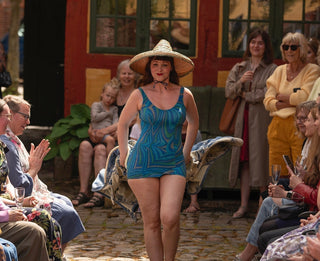1950s fashion blended timeless elegance with the emergence of a new rebellious generation, and marking the debut of the iconic stiletto heel. But how did people actually dress in the 1950s?

A classic 1950's knitwear set, featuring our Sally pullover with our Joanne cardigan, both in a plum color. Matching knit sets like these were very popular in the 1950's.
Womens Fashion in the 1950s
Fashion in the 1950s was characterized by optimism, post-war economic growth, and a desire for traditional beauty and femininity. This decade marked a stark contrast to the practical, frugal styles of World War II, and the fashion became more playful and often romantic, embracing traditional gender roles. At the same time, youth culture began to emerge, creating a counter-reaction to more traditional and formal styles.
The 'New Look' continued
Christian Dior's "New Look" from the late 1940s continued to influence 1950s women's fashion. Dior's style emphasized the hourglass figure, with cinched waists, much like it did during Victorian and early Edwardian times, more than 50 years prior. The skirts were full skirts that fell to mid-calf, enhancing the traditional feminine silhouette. To achieve the voluminous look, many women wore crinolines and petticoats under their skirts, and the pointed bullet bra drew attention to the bust.
Dresses, skirts, and jackets were often tailored with waist darts to accentuate a narrow silhouette. Skirt suits with slim pencil dresses, which hugged the body, also gained popularity during this period, alongside dresses with fuller skirts and cigarette pants paired with cute, feminine shirts.
Small, decorative hats worn at the back of the head were fashionable, and hair was often styled in elegant curls inspired by Marilyn Monroe and Elizabeth Taylor or put up in a bun or ponytail with soft, wavy bangs.
1950s working class women's fashion
In the 1950s, working-class fashion was influenced by the economic recovery after World War II, with an emphasis on practicality, comfort, and durability, but yet had a vibe of optimism and a longing for something different than the practical 1940s fashion.
The 1950s saw the rise of feminine yet functional clothing. Dresses were often simple and practical, made from cotton nylon, and featured modest cuts, with waistlines that were more defined than in previous decades. Aprons were frequently worn by women in domestic work, and durable shoes or low heels were common for factory or retail work. The full-skirted dresses of the time were also popular for casual outings.

A casual 1950s every day look with a red shirt dress and matching with my red Sidse sandals. Note the wide skirt and fitted waist. Photo: Tami Meijburg
1950s upper class womens fashion
As stated previously the 1950s were dominated by the hourglass silhouette. Dresses featured full skirts, often supported by petticoats, nipped-in waists, and deep, flattering necklines. Fabrics like silk, taffeta, and satin were used for formal occasions, while tailored suits became popular for daytime wear. Accessories such as pearls, gloves, and hats completed the polished look. Evening gowns were often elaborate, with luxurious detailing like beading, lace, and embroidery, reflecting the glamorous Hollywood influence.

An elegant 1950s inspired evening look. Note the fitted waist, and elegant, classic details with the gloves and the feather headband placed the back of the head. Photo: Tami Meijburg
1950s Mens Fashion
Men’s fashion in the 1950s was defined by a classic, well-groomed style with tailored cuts and clean lines. Suits were worn with slim silhouettes and narrow lapels, dominated by dark colors like black, gray, and navy. Trousers were high-waisted and often had a straight or slightly wider cut. Casual wear became more relaxed, with cardigans, pullovers, polo shirts, and letterman jackets remaining popular. Hats like fedoras and trilbys were still common as part of formal attire.
1950s working class mens fashion
Working-class outfits typically included durable trousers or jeans, paired with button-up shirts or simple work shirts made from cotton or denim. Overalls and sturdy jackets were common for factory or construction work. Work boots or leather shoes were essential for long hours on the job. Casual styles also became more popular, with men often wearing collared shirts or t-shirts for leisure time. In some cases, items like bomber jackets and knit sweaters reflected military influences and post-war trends.
1950s upper class mens fashion
The 1950s saw the continuation of sharp, tailored suits. The classic two- or three-piece suit with narrow lapels, high-waisted trousers, and crisp shirts was still a staple of upper-class men's wardrobes, though the vest started to slowly disappear. Popular colors included gray, navy, and black, often paired with accessories like pocket squares, cufflinks, and silk ties. For more casual settings, men embraced sport coats and lightweight trousers.
Rock'n'Roll Teenager Rebellion
The 1950s also saw youth gaining influence in fashion. The rock 'n' roll style, with icons like Elvis Presley and James Dean, had a significant impact on teenage fashion. Denim jeans became a symbol of youth rebellion and casual style for both men and women. Leather jackets, associated with rock 'n' roll and motorcycle culture, along with the pompadour hairstyle, represented the rebellious style of the era. For young girls, circle skirts paired with fitted blouses or sweaters became popular, earning the nickname "Sweatergirls."
Saddle shoes became a popular choice for teenagers, worn with both jeans and skirts. Both boys and girls embraced this iconic style, which came in a variety of colours—the most common being brown and white.

Our unisex saddle shoe, Elliot, which became particularly popular among teenagers in the 1950s.
The Invention of stilettos
1950s shoes reflected the decade's focus on femininity, elegance, and sophistication, though they also included more relaxed and youthful styles. The invention of the stiletto heel in the mid-1950s was groundbreaking. Previously, heels had been constructed with wood, which required a broader base for stability. In 1956, the discovery of reinforcing heels with an aluminum rod allowed for a slender, high heel, leading to the creation of the stiletto. Women quickly embraced this long, pointed heel, which became one of the most popular styles of the decade, both for everyday wear and special occasions.

Julia is our elegant 1950s pump with a high, thinner heel.
Pumps and Oxford shoes also remained popular. Among teenage girls, ballet flats and saddle shoes became trendy, inspired by Audrey Hepburn and Brigitte Bardot. Men continued to wear Oxford shoes, while loafers became a popular choice for more casual dressing.
Curious to learn more about the history of classic Oxford shoes and their cousin, the Derby shoe? Check out our in-depth article on this timeless classic, or read about the iconic saddle shoe in:
Sources:
- Shoes - An Illustrated Story by Rebecca Shawcross
- Tidens Mode by Anne-Grete Steckhahn
- Vintage Fashion - Collecting and wearing designer classics by Emma Baxter-Wright, Karen Clarkson, Sarah Kennedy, and Kate Mulvey
- Vintage shoes - Caroline Cox


